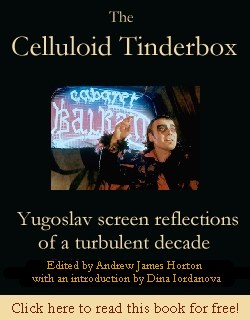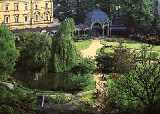Like so many veteran Czech and Slovak filmmakers, Kamila Kytková has spent much of her life paying for the work she did in the liberal 1960s. Born in Liptovský Mikuláš in 1939, she studied philosophy at Prešov and Bratislava in Slovakia, as well as filmmaking at the renowned FAMU film school in Prague.
After some journalistic work, she became a director during the Czechoslovak New Wave of the mid to late 1960s. But the films she made during this period, among them a documentary on the Slovak artist and public intellectual Dominik Tatarka, brought her a good deal of trouble after the Soviet tanks rolled in during the summer of 1968 and "Normalization" began.
Banned from the state film-making apparatus, Kytková worked with amateur filmmakers, primarily in Slovakia, in an underground, samizdat-style film culture during the 1970s and 1980s. Since the Velvet Revolution of 1989, she has been able to find some work, producing short programs and documentaries for such institutions as Czech and Slovak television.
With her most recent work, Démon súhlasu podĺa Tatarku (The Demon of Agreement by Tatarka), a contentious video essay about Slovak history over the last 50 years, Kytková once again stresses the importance of Dominik Tatarka for contemporary Slovakia.
I spoke with Kytková at the Karlovy Vary Film Festival in the Czech Republic in early July 2000, which was the occassion for a special video screening of her latest offering, and I started by asking her about her background.
KK: I'm a journalist by profession. As a young journalist I studied in Slovakia. I began to perceive a discrepancy between what I saw for myself and what I was asked to write.
In the early 1960s, I studied film, and especially documentary, at FAMU in Prague. The atmosphere at FAMU was very free and open. In my student films, I could show the truth, and I could tell the truth about the experience I had gained as a journalist. This was the truth which the Communist system later forbid me to tell the world.
CER: You made a few films, including one about Dominik Tatarka, but then were blacklisted.
KK: I started working as a director in the early 1960s. In the mid or late 1960s, there was some relaxation, and I had gained a reputation. I could pick the subject matter I wanted to deal with. But after the Russian occupation in 1968, that came to an end. After 1968, I actually made three more legal films, in which again I tried to show the truth, but those were banned. One of these was a film about Dominik Tatarka. The current film is an updated version.
CER: Tell me what you did after your films were shelved.
KK: I was not allowed to work in filmmaking. There was no time limit on this ban; my actions were banned forever. I just waited and hoped that the time would come that I would be allowed to start working again.
In the meantime, I was, rather clandestinely, helping some directors in their work. Some of them have gained some stature, for example Andrej Rudavský, who now works in the United States. After 1989, because of the changes, I was able to start working for television again. That was in Prague, while Czechoslovakia still existed.
CER: And once again you returned to the work of Tatarka. Tell me about why he is important.
KK: Dominik Tatarka was the number one Slovak writer of his time, or at least until 1969. He was one of the leading personalities in Czechoslovakia, and he was a Slovak, which was rare. He was very prolific, working as a fiction writer, a screenwriter, an essayist, and a fine art critic. But after 1969, he was banned. He protested the Soviet occupation by withdrawing. About that time, I made the first version of this film.
In the 1970s, during what was called the period of "Normalization," he was one of the first three dissidents. He was offered an opportunity to renounce his previous work and to say he had made a mistake. But, unlike many others, he strictly refused.
CER: But he did keep writing, publishing samizdat editions.
KK: He did work, but he was not allowed to be in contact with anyone. That was done illegally. But many of his works were taken out of the country, and published elsewhere.
He also developed a literary exchange system with people in France. There was a University Professor of Czech and French, Karel Bartošek, who knew Tatarka's work quite well. This professor wrote books including The Black Book of Communism, and he supported Tatarka any way he could, helping to get his works translated into French. From abroad, he joined Charter 77. His students smuggled banned works into Czechoslovakia through Tatarka. They came in legally but brought books illegally.
CER: Tell me a little about Tatarka's work itself.
KK: It had a very strong literary quality. And it was very unusual in that it had an international perspective, despite Tatarka having been a member of the Communist Party in the 1950s. He attacked the lies upon which the official ideology was erected. He published a treatise called Démon súhlasu (The Demon of Agreement), which is part of the title of the film. This is an essay about the flaws of the system.
CER: He has been very important to you now for at least thirty years. I get the feeling that you're saying that his work is not yet done, it hasn't been achieved, and that his work is still important.
He died several months before November 1989. And the further development after 1989 was different in Slovakia than in the Czech Republic, and I think his work shows a different direction we might follow.
Ten years after the Velvet Revolution, in the Czech Republic, there have been many democratic and liberating changes. This is not true in the Slovak Republic. We are still afraid of speaking the truth. Perhaps this is because we have not experienced the catharsis that a revolution can provide. One single Communist Party had existed before; now there are several parties that aren't all that different. There are just more of them. People still cannot confront their consciences or the work and existence of people like Tatarka.
CER: You still cannot talk about him.
KK: Right. His works have not been published,

|
Slovakia right now, unlike the Czech Republic, has no leading intellectual personalities. There are intellectual circles, but these people have mostly withdrawn into the privacy of their homes, just like in the 1970s. All they want now is to make sure no one takes away their personal security.
CER:Tatarka provides, or at least could have provided, a model for these people to come out and become politically engaged intellectuals.
KK: Exactly. And that is part of why he is so important.
CER:And such things as happened to him have happened in the world of cinema.
KK:Yes. And they still do. Several bans were issued while I was making this film. It wasn't just that I was barely supported financially; I was also told I cannot make this film because of the subject. But all these bans just make me more determined.
Ray Privett, 11 September 2000
Moving on:
- For more articles on Central and East European film see the Kinoeye Archive
- Browse through the CER eBookstore for electronic books
- Return to CER front page

Footnotes:
1. Editor's note: Tatarka's book Písačky pro milovanú Lutéciu (Songs for Beloved Lutécia) was published in Prague in the Slovak original by Labyrint press in 1999 and received favorable reviews.




